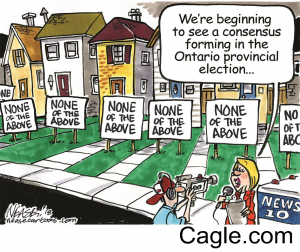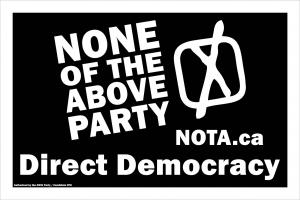None of the Above Direct Democracy Party ahead in 2022 Ontario Election nominations
The None of the Above Direct Democracy Party already has 45 candidates for the June 2, 2022 Ontario Election, ahead of the 42 nominated in 2018.
MISSISSAUGA, ONTARIO, CANADA, February 24, 2022 /EINPresswire.com/ -- The None of the Above Direct Democracy Party (NOTA Party) has already nominated more candidates three months before the June 2, 2022 Ontario Election, than the 42 it nominated in the 2018 election.
Growing from 8 candidates in 7% of ridings in the 2014 to 42 candidates in 34% in the 2018 Ontario Election, the NOTA Party is already ahead with 44 candidates, on the way to nominating candidates in all 124 ridings in the June 2, 2022 Election.
This rapid expansion in just the last two elections from 8 to 42 candidates has made the NOTA Party the fasted growing Ontario party in a century since the United Farmers Party ran 64 candidates in the 1919 Ontario Election.
The CCF/NDP took three elections (1934 - 1943), the Green Party five elections (1985 - 1999), and the Libertarian Party eight elections (1985 - 2011), to nominate as many candidates in an election.
In the 2014 Ontario Election the 29,442 declined ballots were the highest number ever. The media reported the results widely when Elections Ontario released them.
The 2018 Ontario Election had the second highest number of declined ballots ever with 22,684 cast. The combined total of 61,426 declined, spoiled and unmarked ballots was also the second highest (third in percentages) since Ontario's election law was reformed in 1975 to count them separately and collectively.
The combined total of the 2018 NOTA Party vote in 42 ridings of 16,149 with the 22,682 declined ballots was 38,832 ballots, the largest such protest vote since 1975.
The 2018 election was the first since 1975 that the Elections Ontario's unofficial results did not include either a summary of or the individual numbers of declined, spoiled and unmarked ballots on Election Day or shortly thereafter, as was the practice in the past. The poll by poll details of all 124 ridings were released but the summary of these combined results was not released until six months later when tabled in the Legislative Assembly of Ontario.
No summary of the separate totals of votes for individual number of declined, spoiled and unmarked ballots is published by Elections Ontario for the 2018 election, notwithstanding the legislation specifically requires handling and counting all of them separately.
As a result of the current practices of Elections Ontario the public is almost totally unaware of the historic 2018 results for both the combined declined, spoiled and unmarked ballots, and of the individual declined ballots cast, being the second highest ever.
During the 2018 election national citizen advocacy group Democracy Watch complained for the third election in a row about Elections Ontario refusing to commit to mention the right to decline ballots in its TV, radio and print ads, and in other voter education materials, thereby failing to fully inform voters that they even have the right to decline their ballots.
The NOTA Party of Ontario campaigns for the 3Rs of Direct Democracy – Referendum, Recall and Reforms to electoral, legislative, transparency and accountability laws and practices, to give voters control of politicians and parties during and in between elections. Candidates are accountable to their constituents and there are no central party policies or controls of elected MPPs beyond the binding Direct Democracy principles.
In British Columbia's 1991 recall and initiative referendum voters approved both the referendum and recall laws by over 80%. In 1995 then Ontario Progressive Conservative Party leader Mike Harris promised to pass municipal and provincial referendum laws if elected, but he didn't introduce the draft legislation approved at Committee in 1998. On June 17, 2021 Alberta passed a recall law as well.
Switzerland is a rare example of a country with instruments of direct democracy (at the levels of the municipalities, cantons, and federal state). Citizens there have more power than in any representative democracy.
Any Canadian citizen who is a resident in Ontario for at least six months before and 18 years of age or older on Election Day (not otherwise prohibited), may become a candidate in an election by completing and filing the Candidate Nomination Paper (F0400) containing a minimum of 25 signatures from eligible electors in the electoral district in which they are running. They do not have to be a resident in that riding and there is no fee to become a candidate.
Some of the well known NOTA Party candidates nominated for the June 2 , 2022 election are: Hydrofuel Canada CEO Greg Vezina (Mississauga Centre); Canada's first Veterans Ombudsman Col. Pat Stogran Rtd. (Orléans); Stage Manager and G-20 Civil Rights Advocate Adam Nobody (Spadina-Fort York); Author and Creator of TIME-EQUITY Richard Kiernicki (Etobicoke Centre;, Workers Rights Advocate Paul Taylor (Guelph); Aerospace Engineer Kevin Linfield (Essex); and Artist and Broadcasting Technician Marc Adornato (Ottawa-Centre).
Anyone interested in being a candidate can apply on the NOTA Party 2022 candidates page: https://nota.ca/ontario/candidates/
Greg Vezina
None of the Above Direct Democracy Party
+1 905-501-8543
info@nota.ca
Visit us on social media:
Facebook
Twitter
VIDEO: CTV Power Play: Greg Vezina, None of the Above Party (at 3:15 Don Martin predicts a future NOTA Party election landslide.)



